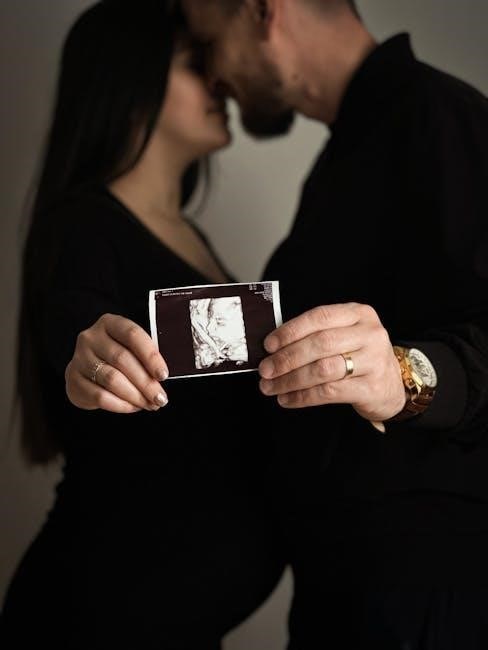Henrietta Lacks’ story reveals how her cervical cancer cells, taken without consent, became the immortal HeLa cells, revolutionizing medicine and sparking ethical debates about patient rights and consent.
1.1. Who Was Henrietta Lacks?
Henrietta Lacks was a Black tobacco farmer and mother of five, diagnosed with cervical cancer in 1951. Her cancer cells, taken without consent, became the immortal HeLa cell line, advancing medical research. Despite her tragic death at 31, her legacy endures, revealing systemic injustices and ethical dilemmas in healthcare. Her story, documented in Rebecca Skloot’s book, highlights the intersection of race, poverty, and medical exploitation, ensuring her life and contributions are remembered and honored.
1.2. The Discovery of HeLa Cells
In 1951, during Henrietta Lacks’ treatment at Johns Hopkins, Dr. George Gey discovered her cervical cancer cells. These cells, later named HeLa, were the first human cells to divide indefinitely, making them invaluable for research. Their unique ability to grow and thrive in labs led to numerous medical breakthroughs, revolutionizing fields like cancer research, vaccine development, and gene mapping, and contributed significantly to scientific progress.
1.3. The Significance of the Immortal Life of Henrietta Lacks
Henrietta Lacks’ immortal cells have profoundly impacted medicine, enabling breakthroughs in cancer research, vaccine development, and gene mapping. Her story has sparked ethical debates about consent, race, and medical justice. The Immortal Life of Henrietta Lacks highlights her legacy, ensuring her contributions are recognized and honored, while advocating for patient rights and ethical standards in scientific research.

The History of Henrietta Lacks and Her Cells
Henrietta Lacks was diagnosed with cervical cancer in 1951. Her cancer cells, taken without consent, became the HeLa cell line, revolutionizing medical research and science forever.
2.1. Henrietta Lacks’ Early Life and Diagnosis
Henrietta Lacks was born in 1920 to a poor tobacco-farming family in Virginia. She grew up in a racially segregated community and married David Lacks, raising five children. In 1951, she sought treatment at Johns Hopkins Hospital for abdominal pain, leading to her cervical cancer diagnosis. Her cells were taken during treatment, initiating the HeLa cell line without her knowledge or consent, forever altering medical history.
2.2. The Unethical Removal of Her Cells
Henrietta Lacks’ cells were taken without her consent during a 1951 hospital visit for cervical cancer treatment. Medical ethics of the time, particularly for Black patients, often disregarded patient rights. The cells were shared widely, launching groundbreaking research. However, the lack of informed consent and racial disparities in medical treatment underscore the ethical concerns surrounding her case, highlighting systemic injustices faced by marginalized communities in healthcare.
2.3. The Birth of the HeLa Cell Line
The HeLa cell line emerged when Henrietta Lacks’ cancer cells were cultured by Dr. George Gey, discovering their unique ability to divide indefinitely. This breakthrough led to unprecedented medical advancements, aiding in the development of vaccines, cancer treatments, and gene mapping. The HeLa cells became a cornerstone in scientific research, yet their origin remained shrouded in ethical controversy, raising questions about patient rights and the commercialization of biological materials.
The Impact of HeLa Cells on Medical Research
The HeLa cells revolutionized medical research, aiding in cancer treatments, vaccine development, and genetic studies, becoming a cornerstone for scientific advancements and disease understanding.
3.1. Contributions to Cancer Research
Henrietta Lacks’ HeLa cells have been pivotal in cancer research, enabling scientists to study tumor growth, test treatments, and develop targeted therapies. These cells helped identify genetic mutations and pathways involved in cancer progression. By providing a consistent and renewable resource, HeLa cells accelerated the discovery of chemotherapy drugs and radiation therapies. Their immortal nature allowed for extensive experimentation, leading to breakthroughs in understanding and combating various cancers, ultimately saving countless lives.
3.2. Role in the Development of the Polio Vaccine
Henrietta Lacks’ HeLa cells played a crucial role in the development of the polio vaccine. Scientists used HeLa cells to test and grow the poliovirus, enabling the creation of both inactivated and oral polio vaccines. This breakthrough led to the near eradication of polio worldwide. The cells’ ability to thrive in labs made them an indispensable tool for vaccine testing, ensuring safety and efficacy before human trials. HeLa cells’ contribution to polio research remains a cornerstone of medical history.
3.3. Advances in Gene Mapping and Cloning
The HeLa cells significantly contributed to gene mapping and cloning by providing a stable, immortal cell line for genetic studies. Scientists used HeLa cells to identify and isolate specific genes, enabling advancements in understanding human genetics. Techniques like fluorescence in situ hybridization (FISH) were refined using HeLa cells, aiding in pinpointing gene locations on chromosomes. This research laid the foundation for modern genetic engineering and personalized medicine, further solidifying Henrietta Lacks’ legacy in scientific progress.
Ethical Concerns and Controversies
The unethical removal of Henrietta Lacks’ cells without consent sparked debates on patient rights, racism in medicine, and the commercialization of human tissues, highlighting systemic injustices.

4.1. Lack of Consent and Patient Rights
The case of Henrietta Lacks highlights a critical ethical issue: her cells were taken without her knowledge or consent, a common practice in 1950s medicine, especially for marginalized patients. This lack of consent has sparked decades of debate about patient rights, autonomy, and the exploitation of vulnerable populations. The commercialization of HeLa cells without benefit to her family further underscores the ethical complexities surrounding medical research and the need for informed consent. This case has become a landmark example in bioethics.
4.2. Racism and Systemic Injustice in Medicine
The story of Henrietta Lacks exposes systemic racism in 1950s medicine, where Black patients often received inadequate care and were exploited for research. Her cells were taken without consent, reflecting broader ethical violations against marginalized communities. The lack of respect for her autonomy underscores the intersection of race and medical injustice. Rebecca Skloot’s book sheds light on these disparities, highlighting how systemic racism perpetuated inequality in healthcare and research, with lasting implications for Black patients and families like Henrietta’s.
4.3. The Commercialization of HeLa Cells
The HeLa cell line became a multimillion-dollar industry, with companies profiting from their use in research and product development. Despite the cells’ immense value, Henrietta Lacks’ family received no compensation, highlighting systemic exploitation. The commercialization of her cells without consent or benefit to her family underscores ethical failures in medical research and the commodification of human tissue, raising questions about justice and equity in scientific progress.

Rebecca Skloot and the Book’s Creation
Rebecca Skloot’s meticulous research and storytelling brought Henrietta Lacks’ story to life, blending science, ethics, and humanity. Her book, translated into multiple languages, sparked global awareness.
5.1. The Author’s Journey in Writing the Book
Rebecca Skloot dedicated over a decade to uncovering Henrietta Lacks’ story, navigating ethical dilemmas and building trust with her family. Her meticulous research and empathetic approach revealed the intersection of science, race, and humanity, ensuring Henrietta’s legacy was shared respectfully and accurately.
5.2. The Narrative Structure of the Book
The book masterfully intertwines Henrietta’s personal story with the scientific triumphs of her cells. Skloot alternates between Henrietta’s life, her family’s experiences, and the HeLa cells’ impact on medicine, creating a compelling narrative that balances humanity and science, ensuring readers connect emotionally with the ethical implications of her immortal legacy.
5.3. The Role of the Henrietta Lacks Foundation

The Henrietta Lacks Foundation, established by Rebecca Skloot, aims to honor Henrietta’s legacy and address ethical issues in medical research. It provides support to the Lacks family and advocates for justice in biomedical research. The foundation raises awareness about the importance of informed consent and promotes equity in healthcare, ensuring Henrietta’s story inspires positive change and recognition of her enduring impact on science and humanity.

The Immortal Life of Henrietta Lacks in Popular Culture
The book and Henrietta’s story have inspired an HBO film, sparking widespread discussion about ethics and race, cementing her legacy as a cultural and scientific icon.
6.1. The HBO Film Adaptation
The HBO film adaptation, produced by Oprah Winfrey and Alan Ball, brought Henrietta Lacks’ story to the screen, highlighting her legacy and the ethical issues surrounding her cells. The film starred Oprah Winfrey as Deborah Lacks, Henrietta’s daughter, and Renee Elise Goldsberry as Henrietta. It received critical acclaim for its portrayal of the family’s journey and the impact of HeLa cells on medical research, further popularizing her story and its significance in modern science.
6.2. Public Reception and Reviews
The HBO film adaptation of Henrietta Lacks’ story received widespread critical acclaim and emotional resonance with audiences. Critics praised its thoughtful portrayal of the Lacks family’s journey, emphasizing the ethical dilemmas and racial injustices intertwined with the HeLa cells’ discovery. Viewers found the film deeply moving, highlighting its cultural significance and ability to spark conversations about medical ethics and systemic inequality. The adaptation further cemented Henrietta Lacks’ legacy as a symbol of both scientific progress and human rights advocacy.
6.3. Educational Use of the Book
The Immortal Life of Henrietta Lacks has become a cornerstone in educational curriculums, sparking discussions on bioethics, race, and patient rights. Its availability as a PDF and other formats has made it accessible for students worldwide. The book is widely used in high school and college courses, encouraging critical thinking about the intersection of science and humanity. Its narrative structure and ethical dilemmas provide a compelling framework for teaching complex topics in medicine, sociology, and history.

The Family’s Perspective and Advocacy
The Lacks family faced systemic injustices and poverty, struggling for recognition of Henrietta’s contributions to science. They became vocal advocates for patient rights and ethical awareness.
7.1. The Lacks Family’s Struggle for Recognition
The Lacks family endured decades of obscurity despite Henrietta’s cells revolutionizing medicine. Their story, marked by poverty and systemic racism, highlights the ethical failures surrounding HeLa cells’ discovery. The family’s struggle for recognition began with Rebecca Skloot’s efforts to document their experiences, revealing their resilience and fight for justice in the face of exploitation. Their journey underscores the importance of acknowledging the human cost behind scientific progress.
7.2. Their Role in Modern Medical Ethics
The Lacks family’s story has reshaped modern medical ethics, emphasizing the importance of informed consent and patient rights. The Henrietta Lacks Foundation advocates for transparency in biomedical research, ensuring that patients’ voices are heard. Their journey has influenced stricter regulations on cell and tissue use, promoting ethical practices in science. By sharing their experiences, the Lacks family continues to inspire reforms, fostering a more equitable and respectful approach to medical research and patient care.
7.3. Advocacy for Patient Rights and Awareness
The Lacks family has become a powerful voice in advocating for patient rights, particularly in the use of biological samples. Through education and public outreach, they raise awareness about the importance of informed consent and ethical research practices. Their efforts have inspired reforms in medical ethics, ensuring that patients’ autonomy is respected. By collaborating with organizations and sharing their story, the Lacks family continues to promote transparency and accountability in healthcare and biomedical research.
Legal and Medical Implications Today
Modern laws now require patient consent for cell use, with strict ethical guidelines to protect privacy. This ensures transparency and respect for individuals’ rights.
8.1. Changes in Medical Consent Laws
The case of Henrietta Lacks led to significant reforms in medical consent laws. Today, informed consent is mandatory, ensuring patients understand and agree to procedures. Laws now require clear communication about how biological samples will be used, protecting patient autonomy. The establishment of institutional review boards (IRBs) oversees research practices, ensuring ethical standards are met. These changes aim to prevent the exploitation experienced by Henrietta Lacks, promoting transparency and respect for patient rights in medical research.
8.2. Current Ethical Guidelines for Cell Use
Modern ethical guidelines emphasize patient autonomy and consent for cell use. Researchers must obtain explicit permission before using biological samples, ensuring transparency about their intended use. These guidelines address issues highlighted by the Henrietta Lacks case, mandating that patients are informed and involved in decisions regarding their tissues. Additionally, measures are in place to protect privacy and prevent commercial exploitation without consent, fostering trust between patients and the scientific community while advancing medical innovation responsibly.
8.3. Ongoing debates about Biomedical Research
Ongoing debates in biomedical research focus on ethical dilemmas, particularly regarding the use of human tissues without consent. Henrietta Lacks’ case highlights tensions between scientific progress and patient rights. Discussions center on balancing innovation with respect for individuals’ autonomy, privacy, and fair compensation. Advocates push for clearer policies to address these issues, ensuring that historical injustices are not repeated while advancing life-saving research responsibly and ethically.
The Cultural and Historical Context
Henrietta Lacks, a Black tobacco farmer, lived during a time of racial segregation and medical exploitation. Her story reflects the intersection of race, poverty, and systemic injustice in 1950s America.
9.1. Race and Medicine in the 1950s
In the 1950s, racial segregation and discrimination permeated every aspect of American life, including healthcare. Black patients like Henrietta Lacks often received substandard care in segregated wards, with limited access to resources. The exploitation of Black bodies for medical research was a grim reality, reflecting systemic racism. Henrietta’s cells were taken without consent, a practice all too common in a era where Black patients were often treated as less than human. This backdrop of inequality shaped the unethical treatment of Henrietta and countless others.
9.2. The Intersection of Poverty and Healthcare
Poverty deeply intertwined with healthcare disparities in 1950s America. Henrietta Lacks, a poor Black woman, relied on public hospitals offering free treatment. These institutions often subjected patients to experimental procedures without consent, viewing them as expendable. The lack of financial resources meant limited access to quality care, exacerbating existing health inequalities. Henrietta’s case highlights how poverty and race created a vulnerable population exploited for medical advancement, with their bodies commodified without regard for their rights or humanity;

9.3. The Legacy of Henrietta Lacks in Modern Society
Henrietta Lacks’ story has left an indelible mark on modern society, sparking conversations about medical ethics, race, and class; Her immortal cells have driven breakthroughs in cancer, polio, and genetic research, saving countless lives. The book and film adaptation of her story have raised awareness about patient rights and the exploitation of marginalized communities. Today, Henrietta Lacks is celebrated as a symbol of resilience and a catalyst for change, ensuring her legacy extends far beyond the laboratory, inspiring future generations to advocate for justice and equality in healthcare.
Henrietta Lacks’ enduring impact underscores the importance of ethical research and patient rights. Her story continues to inspire advancements in medicine and advocate for justice in healthcare.
10.1. The Enduring Impact of Henrietta Lacks
Henrietta Lacks’ HeLa cells have revolutionized medical science, contributing to cancer research, polio vaccines, and gene mapping. Her legacy highlights ethical dilemmas in patient rights and consent, inspiring reforms. Despite her cells’ vast impact, her family faced decades of injustice, underscoring systemic inequities. Rebecca Skloot’s book brought her story to light, sparking global awareness of medical ethics and the need for informed consent, ensuring Henrietta’s influence extends beyond science to advocate for justice and equality in healthcare.
10.2. Lessons Learned and Moving Forward
The story of Henrietta Lacks underscores the importance of informed consent and ethical medical practices. Her case led to reforms in patient rights and the handling of biological samples. Rebecca Skloot’s work and the Henrietta Lacks Foundation continue to advocate for transparency and justice. Moving forward, the medical community must prioritize ethical guidelines, ensuring that scientific progress respects individual dignity. Henrietta’s legacy serves as a reminder of the need for ongoing dialogue about biomedical ethics and patient autonomy.
10.3. The Immortal Life’s Message for Future Generations
Henrietta Lacks’ story offers a profound message about the intersection of science, ethics, and humanity. Her immortal cells have driven medical advancements, yet her exploitation highlights the need for respect and consent. Future generations must learn from her legacy to ensure ethical practices in research and medicine. By honoring her contributions, we advocate for transparency, justice, and the rights of individuals in scientific progress. Henrietta’s story continues to inspire dialogue about the balance between innovation and human dignity.